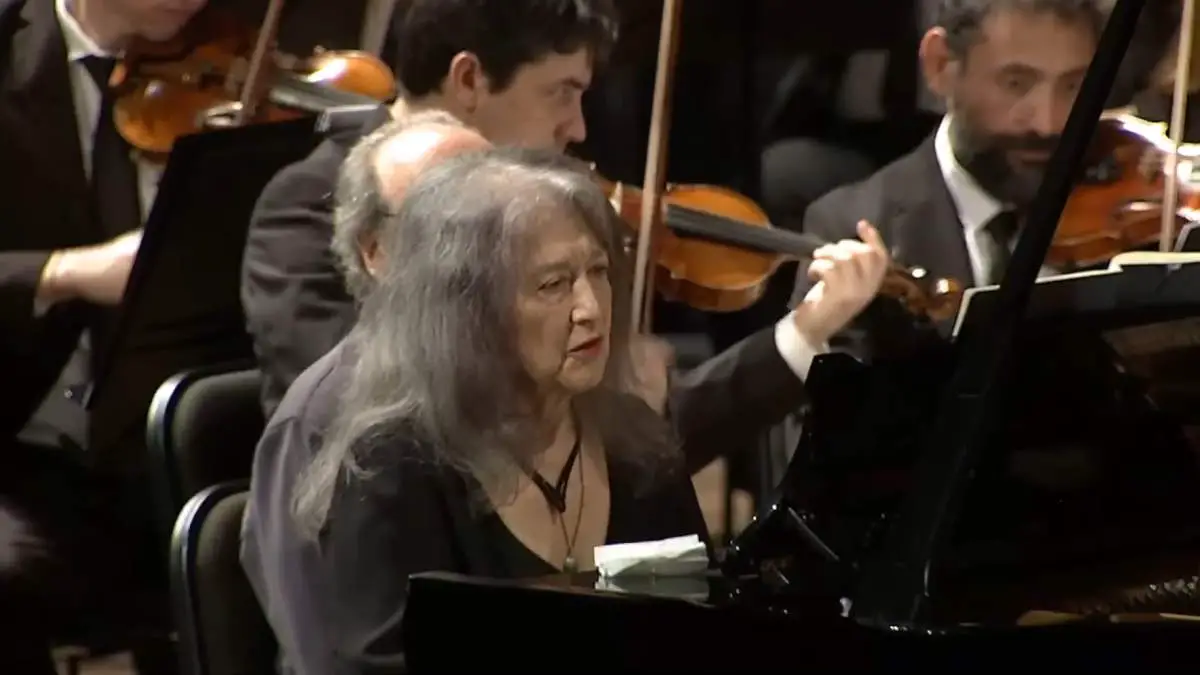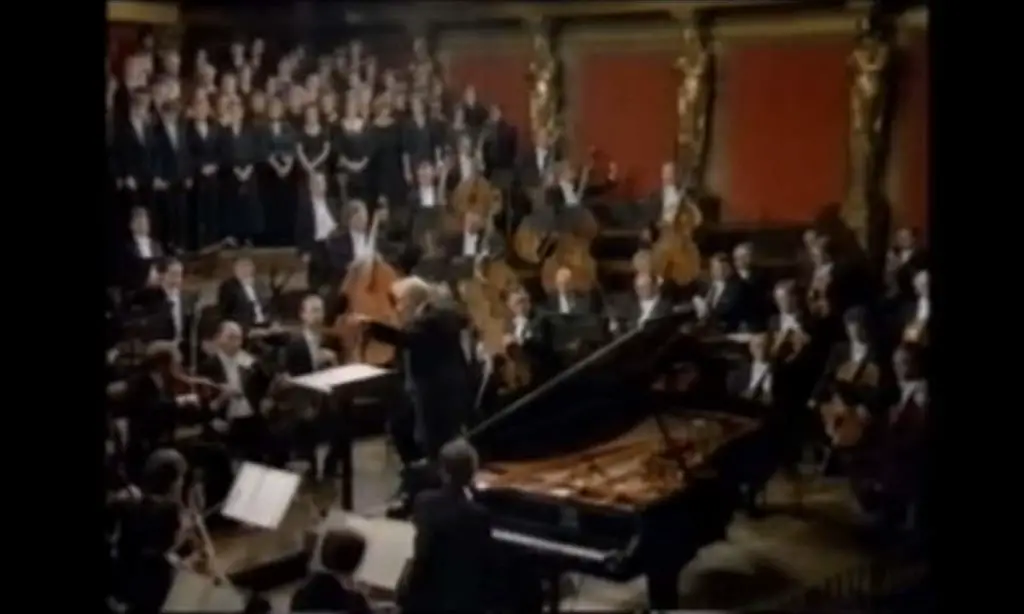Accompanied by the Orquesta and Chorus of the Teatro Colón, the great Argentine pianist Martha Argerich performs Ludwig van Beethoven’s Fantasy for piano, vocal soloists, mixed chorus, and orchestra, Op. 80, usually called the Choral Fantasy. Encore: Robert Schumann’s Kinderszenen No. 1. Conductor: Charles Dutoit. Recorded at the Teatro Colón, Buenos Aires, Argentina on July 30, 2023.
Ludwig van Beethoven’s Choral Fantasy
Ludwig van Beethoven’s Choral Fantasy, Op. 80, formally known as “Fantasia in C minor for Piano, Chorus, and Orchestra,” is a unique and innovative piece that stands out in the composer’s repertoire. Composed in 1808, it is often considered a forerunner to the famous “Symphony No. 9,” particularly due to its use of a chorus and soloists in the final section, which was a novel idea at the time.
The Choral Fantasy was written for a benefit concert that took place in December 1808, a marathon event that also saw the premieres of Beethoven’s Fifth and Sixth Symphonies. It is notable for its combination of various musical elements and genres. The piece starts with a solo piano, which introduces thematic material that is later taken up by the orchestra and, ultimately, the chorus and vocal soloists.
The lyrics of the Choral Fantasy were written by Christoph Kuffner, a poet and playwright. They reflect themes of unity, joy, and the brotherhood of man, themes that resonate closely with those found in the Ninth Symphony. The text praises the power of music and its ability to bring people together, a sentiment that Beethoven strongly believed in and expressed in many of his works.
Beethoven himself was the soloist at the premiere, and the performance was a challenging one. It is reported that there were problems during the premiere, including Beethoven having to stop and restart the performance. Despite these initial difficulties, the Choral Fantasy has grown in popularity and is now considered a significant work in Beethoven’s oeuvre.
The Choral Fantasy’s structure is unusual: it starts as a piano concerto with a lengthy improvisatory piano solo, transitions into a theme and variations with orchestra and soloists, and finally concludes with a grand choral finale. This progression showcases Beethoven’s skill in blending different musical forms and his innovative approach to composition.
The piece is often performed today, celebrated for its beauty, complexity, and the way it foreshadows the choral elements that Beethoven would later perfect in his Ninth Symphony. The Choral Fantasy is a testament to Beethoven’s genius in creating music that bridges solo, orchestral, and choral elements, and it remains a beloved part of the classical music repertoire.
Beethoven’s Choral Fantasy Text
German
Schmeichelnd hold und lieblich klingen
unseres Lebens Harmonien,
und dem Schönheitssinn entschwingen
Blumen sich, die ewig blühn.
Fried und Freude gleiten freundlich
wie der Wellen Wechselspiel.
Was sich drängte rauh und feindlich,
ordnet sich zu Hochgefühl.
Wenn der Töne Zauber walten
und des Wortes Weihe spricht,
muss sich Herrliches gestalten,
Nacht und Stürme werden Licht.
Äuss’re Ruhe, inn’re Wonne
herrschen für den Glücklichen.
Doch der Künste Frühlingssonne
lässt aus beiden Licht entstehn.
Großes, das ins Herz gedrungen,
blüht dann neu und schön empor.
Hat ein Geist sich aufgeschwungen,
hallt ihm stets ein Geisterchor.
Nehmt denn hin, ihr schönen Seelen,
froh die Gaben schöner Kunst
Wenn sich Lieb und Kraft vermählen,
lohnt den Menschen Göttergunst.
English translation
Graceful, charming and sweet is the sound
Of our life’s harmonies,
and from a sense of beauty arise
Flowers which eternally bloom.
Peace and joy advance in perfect concord,
like the changing play of the waves.
All that was harsh and hostile,
has turned into sublime delight.
When music’s enchantment reigns,
speaking of the sacred word,
Magnificence takes form,
The night and the tempest turns to light:
Outer peace and inner bliss
Reign o’er the fortunate ones.
All art in the spring’s sun
Let light flow from both.
Greatness, once it has pierced the heart,
Then blooms anew in all its beauty.
Once one’s being has taken flight,
A choir of spirits resounds in response.
Accept then, you beautiful souls,
Joyously the gifts of high art.
When love and strength are united,
Divine grace is bestowed upon Man.
Sources
- Choral Fantasy (Beethoven) on Wikipedia

![Beethoven: Choral Fantasy [Argerich, Saito Kinen Orchestra]](https://cdn-0.andantemoderato.com/wp-content/uploads/2016/06/Beethoven-Choral-Fantasy-Martha-Argerich-Saito-Kinen-1024x576.jpg)
